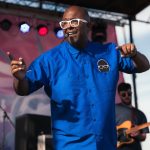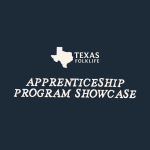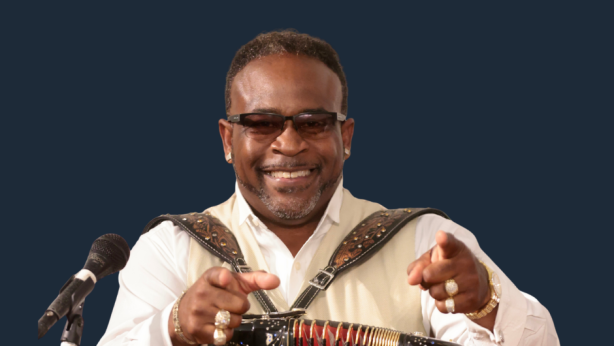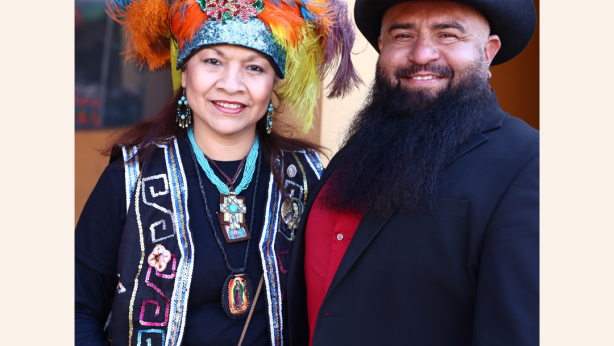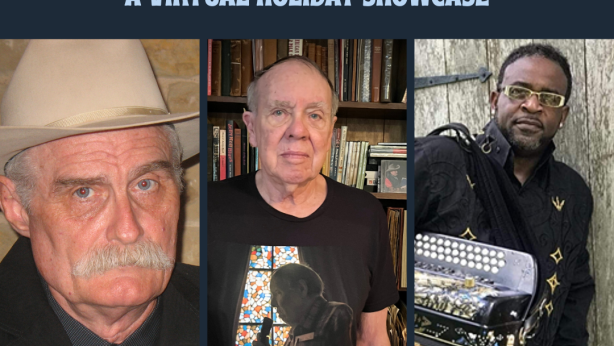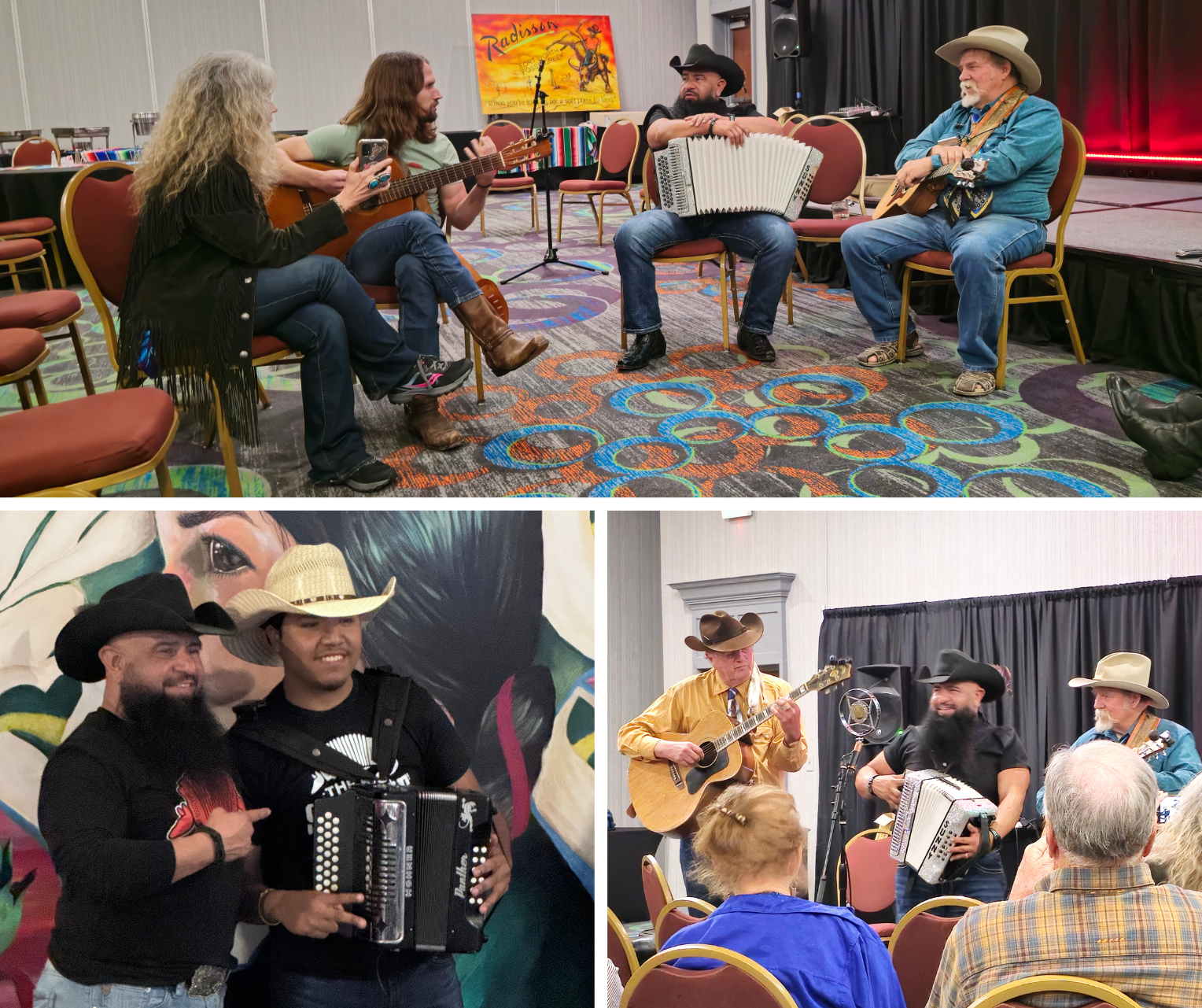
Beyond Events: The True Impact of Folklorism
Sunny Sauceda
Director of Musical Heritage
Texas Folklife
At Texas Folklife, our work begins long before the first note is played and continues long after the curtain falls. Through programs that center tradition bearers, culture keepers, and communities, we create platforms for connection, storytelling, and preservation. It’s not just about events. It’s about meaningful outreach, dedicated fieldwork, and making a lasting cultural impact.
As part of our expanding impact portfolio, one of the programs we’ve launched is the Conjunto Apprenticeship Sustainability Project. We’ve also led multiple outreach efforts across the Rio Grande Valley, including table talks and a grant writing workshop. We hosted a virtual table talk with the North Texas Polka Society, engaged in cultural exchange with Zydeco tradition bearers in Lake Charles, Louisiana, and laid the foundation for new connections in West Texas.
Our presence has also extended to Lancaster and East Texas, including Nacogdoches, where our work continues through conversations and cultural activation. Programs like our Front Porch Talks demonstrate our commitment to listening deeply, building trust, and connecting with communities on their terms.
I’ve had the privilege of attending and supporting a range of cornerstone cultural experiences:
-
Guadalupe Conjunto Festival (San Antonio)
-
National Polka Festival (Ennis)
-
Texas Best (Texas Southmost College)
-
San Antonio Folklife and Dance Festival
-
San Antonio Mayoral Breakfast
-
Tejano Roots Hall of Fame Ceremony
-
Texas Conjunto Hall of Fame Induction Ceremony
Each of these events offers a unique lens into the rich musical traditions and civic life of our state. We’ve organized Intercultural Harmony Events, Bridging Borders gatherings, our “Our Batch” series, and salon-style conversations. These are all designed to build community, foster cultural dialogue, and create meaningful spaces for connection through music and storytelling.
Whether blending genres like Tejano, Polka, and Norteño, or inviting tradition bearers to speak in intimate settings, these efforts embody the living nature of folklorism.
In addition to my role at Texas Folklife, I am a multi-GRAMMY-winning music artist and BMI-affiliated songwriter, working with Azteca Records and Azteca Ranch Music. With 43 years in the industry, I’ve had the honor of collaborating with Pat Jasper, one of our founding mothers, and have worked alongside every past Executive Director of Texas Folklife. Not just as an administrator, but as an artist. This lived experience shapes how I lead. I approach the mission from the stage, the studio, and the community as a tradition bearer and cultural worker.
While attending the Society of Applied Anthropology Conference in Portland, Oregon, I had a realization: I’ve been living this work for decades. Thanks to my mentor, Dr. Elisha Oliver, a bicultural anthropologist, I came to understand that I am what you might call an organic anthropologist. She didn’t just teach me the language. She helped me recognize that this path was always within me.
At Texas Folklife, our work is anthropology in motion. We don’t just study culture. We engage with it. We don’t just preserve traditions. We carry them forward. This is not theoretical. It’s lived. And it’s this integration of anthropology, arts, and community that gives our work both meaning and momentum.
We’re not just folklorists, performers, or directors. We are ambassadors. We carry the flag of culture and tradition everywhere we go. I don’t live in an “it’s not my job” world. That’s stinkin’ thinking. This is a calling. Whether I’m on a school field trip or backstage at America’s Got Talent, this work never clocks out. It lives in how I speak, what I wear, what I sing, and who I uplift. Every interaction is a chance to represent. That visibility creates understanding. And understanding leads to preservation.
As a storyteller with the Texas Folklore Society, I’ve seen how stories preserve not just memory, but identity, pride, and possibility. We measure our impact not only by recordings or reports, but by the number of hands we shake, the voices we uplift, and the trust we build.
This work isn’t about checking boxes or making appearances. Our community partners across Texas haven’t just asked us to visit. They’ve asked us to return. To stand with them. To stay present. To sit at their tables, break bread, share stories, and listen without interruption. That’s not performance. That’s presence. And when you’re truly present, you don’t just attend. You answer the call. Not with convenience, but with commitment.
Being consistently present is just as vital as any concert, archive, or festival. It’s what turns preservation into a shared, living process.
I take pride in representing our sector through:
-
Arts Advocacy Day
-
Texas Music Advocacy Day
-
The Texas Chapter of the Recording Academy (GRAMMYs)
-
And soon, Music Advocacy Day at the Capitol this September
Earlier this year, I stood alongside our community partners at the Texas Capitol in solidarity, amplifying statewide efforts led by Texans for the Arts and the Texas Cultural Trust. Because being a folklorist means being a voice not just for stories, but for policy, preservation, and people.
Folklorism isn’t just something we study or celebrate. It’s something we live, nurture, and fight for. It’s more than tradition. It’s a cultural asset with real economic value.
The arts drive tourism.
They sustain small businesses.
They attract investment.
They build communities where people want to live, work, and belong.
But how do we measure that? How do we quantify the ROI of a story? Of a tradition? Of a handshake?
These are the questions we must continue to ask. Because when culture is treated as infrastructure, not entertainment, we unlock its full potential to heal, connect, and build.
Folklore isn’t just who we are. It’s the foundation of the future we’re creating together. And from a multi-GRAMMY-winning tradition bearer, I can tell you: it’s worth fighting for.
We don’t do this work for applause. We do it because we know what’s at stake.
Culture is not entertainment. It’s infrastructure.
It’s not extra. It’s essential.
It’s how we heal, how we connect, and how we carry our stories forward.
Folklore isn’t just who we are. It’s part of the economy we’re building together.

